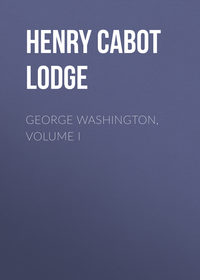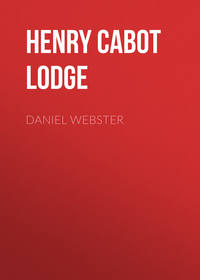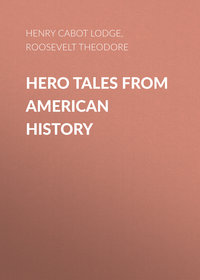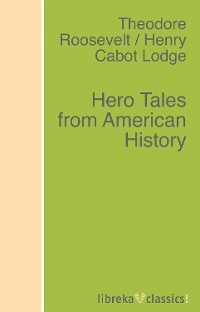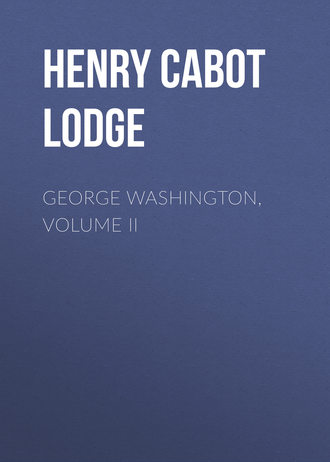 полная версия
полная версияGeorge Washington, Volume II
Careful and painstaking, however, as Washington was in the matter of appointments and organization, dealing with them as if he was about to take the field at the head of the army, there was never a moment when he felt that there was danger of actual war. He had studied foreign affairs and the conditions of Europe too well to be much deceived about them, and least of all in regard to France. He felt from the beginning that the moment we displayed a proper spirit, began to arm, and fought one or two French ships successfully, that France would leave off bullying and abusing us, and make a satisfactory peace. The declared adherent of the maxim that to prepare for war was the most effectual means of preserving peace, he felt that never was it more important to carry out this doctrine than now; and it was for this reason that he labored so hard and gave so much thought to army organization at a time when he felt more than ever the need of repose, and shrank from the least semblance of a return to public life. In all his long career there was never a better instance of his devoted patriotism than his coming forward in this way at the sacrifice of every personal wish after his retirement from the presidency.
Yet, although he closely watched the course of politics, and gave, as has been said, a cordial support to the administration, his sympathies were rather with the opponents of the President within the ranks of their common party. The conduct of Gerry, who had been Adams's personal selection for a commissioner, was very distasteful to Washington, and was very far from exciting in his mind the approval which it drew from Mr. Adams. He wrote to Pickering on October 18: "With respect to Mr. Gerry, his own character and public satisfaction require better evidence than his letter to the minister of foreign relations to prove the propriety of his conduct during his envoyship." He did not believe that we were to have war with France, but he was very confident that a bold and somewhat uncompromising attitude was the best one for the country, and that above all we should not palter with France after the affronts to which we had been subjected. When President Adams, therefore, made his sudden change of policy by nominating Murray as a special envoy, Washington, despite his desire for peace, was by no means enthusiastic in his approval of the methods by which it was sought. The President wrote him announcing the appointment of Murray, and Washington acknowledged the letter and the information without any comment. He saw, of course, that as the President had seen fit to take the step he must be sustained, and he wrote to Murray to impress upon him the gravity of the mission with which he was intrusted; but he had serious doubts as to the success of such a mission under such conditions, and when delays occurred he was not without hopes of a final abandonment. The day after his letter to Murray he wrote to Hamilton: "I was surprised at the measure, how much more so at the manner of it! This business seems to have commenced in an evil hour, and under unfavorable auspices. I wish mischief may not tread in all its steps, and be the final result of the measure. A wide door was open, through which a retreat might have been made from the first faux pas, the shutting of which, to those who are not behind the curtain and are as little acquainted with the secrets of the cabinet as I am, is, from the present aspect of European affairs, quite incomprehensible." He hoped but little good from the mission, although it had his fervent wishes for its success, expressed repeatedly in letters to members of the cabinet; and while he was full of apprehension, he had a firm faith that all would end well.
For this anxiety, indeed, there was abundant reason. A violent change of policy toward France, the disorders occasioned by political dissensions at home, and the sudden appearance of the deadly doctrine of nullification, all combined to excite alarm in the mind of a man who looked as far into the future and as deep beneath the surface of things as did Washington. It was then that he urged Patrick Henry to reenter public life, and exerted his own influence wherever he could to check the separatist movement set on foot by Jefferson. He was deeply disturbed, too, by the tendencies of the times in other directions. The delirium of the French Revolution was not confined to France. Her soldiers bore with them the new doctrines, while far beyond the utmost reach of her armies flew the ideas engendered in the fevered air of Paris. Wherever they alighted they touched men and stung them to madness, and the madness that they bred was not confined to those who believed the new gospel, but was shared equally by those who resisted and loathed it. Burke, in his way, was as much crazed as Camille Desmoulins, and it seemed impossible for people living in the midst of that terrific convulsion of society to retain their judgment. Nowhere ought men to have been better able to withstand the contagion of the revolution than in America, and yet even here it produced the same results as in countries nearly affected by it. The party of opposition to the government became first ludicrous and then dangerous, in their wild admiration and senseless imitation of ideas and practices as utterly alien to the people of the United States as cannibalism or fire-worship. Then the Federalists, on their side, fell beneath the spell. The overthrow of religion, society, property, and morals, which they beheld in Paris, seemed to them to be threatening their own country, and they became as extreme as their opponents in the exactly opposite direction. Federalist divines came to look upon Jefferson, the most timid and prudent of men, as a Marat or Robespierre, ready to reproduce the excesses of his prototypes; while Pickering, Wolcott, and all their friends in public life regarded themselves as engaged in a struggle for the preservation of order and society and of all that they held most dear. They were in the habit of comparing French principles to a pestilence, and the French republic to a raging tiger. Even Hamilton was so moved as to believe that the United States were on the verge of anarchy, and he laid down his life at last in a senseless duel because he thought that his refusal to fight would disable him for leading the forces of order when the final crash came.
Washington, with his strong, calm judgment and his penetrating vision, was less affected than any of those who had followed and sustained him; but he was by no means untouched, and if we try to put ourselves in his place, his views seem far from unreasonable. He had at the outset wished well to the great movement in France, although even then he doubted its final success. Very soon, however, doubts changed to suspicions, and suspicions to conviction. As he saw the French revolution move on in its inevitable path, he came to hate and dread its deeds, its policies, and its doctrines. To a man of his temper it could not have been otherwise, for license and disorder were above all things detestable to him. They were the immediate fruits of the French revolution, and when he saw a party devoted to France preaching the same ideas in the United States, he could not but feel that there was a real and practical danger confronting the country. This was why he felt that we needed an energetic policy, and it was on this account that he distrusted the President's renewed effort for peace. The course of the opposition, as he saw it, threatened not merely the existence of the Union, but wittingly or unwittingly struck at the very foundations of society. His anxiety did not make him violent, as was the case with lesser men, but it convinced him of the necessity of strong measures, and he was not a man to shrink from vigorous action. He was quite prepared to do all that could be done to maintain the authority of the government, which he considered equivalent to the protection of society, and for this reason he approved of the Alien and Sedition acts.
In the process of time these two famous laws have come to be universally condemned, and those who have not questioned their constitutionality have declared them wrong, inexpedient and impolitic, and the immediate cause of the overthrow of the party responsible for them. Everybody has made haste to disown them, and there has been a general effort on the part of Federalist sympathizers to throw the blame for them on persons unknown. Biographers, especially, have tried zealously to clear the skirts of their heroes from any connection with these obnoxious acts; but the truth is, that, whether right or wrong, wise or unwise, these laws had the entire support of the ruling party from the President down. Hamilton, who objected to the first draft because it was needlessly violent, approved the purpose and principle of the legislation; and Washington was no exception to the general rule. He was calm about it, but his approbation was none the less distinct, and he took pains to circulate a sound argument, when he met with one, in justification of the Alien and Sedition acts.13 In November, 1798, Alexander Spotswood wrote to him, asking his judgment on those laws. As the writer announced himself to be thoroughly convinced of their unconstitutionally, Washington, with a little sarcasm, declined to enter into argument with him. "But," he continued, "I will take the liberty of advising such as are not 'thoroughly convinced,' and whose minds are yet open to conviction, to read the pieces and hear the arguments which have been adduced in favor of, as well as those against, the constitutionality and expediency of those laws, before they decide and consider to what lengths a certain description of men in our country have already driven, and seem resolved further to drive matters, and then ask themselves if it is not time and expedient to resort to protecting laws against aliens (for citizens, you certainly know, are not affected by that law), who acknowledge no allegiance to this country, and in many instances are sent among us, as there is the best circumstantial evidence to prove, for the express purpose of poisoning the minds of our people and sowing dissensions among them, in order to alienate their affections from the government of their choice, thereby endeavoring to dissolve the Union, and of course the fair and happy prospects which are unfolding to our view from the Revolution."
With these strong and decided feelings as to the proper policy to be adopted, and with such grave apprehensions as to the outcome of existing difficulties, Washington was deeply distressed by the divisions which he saw springing up among the Federalists. From his point of view it was bad enough to have the people of the country divided into two great parties; but that one of those parties, that which was devoted to the maintenance of order and the preservation of the Union, should be torn by internal dissensions, seemed to him almost inconceivable. He regarded the conduct of the party and of its leaders with quite as much indignation as sorrow, for it seemed to him that they were unpatriotic and false to their trust in permitting for a moment these personal factions which could have but one result. He wrote to Trumbull on August 30, 1799:—
"It is too interesting not to be again repeated, that if principles instead of men are not the steady pursuit of the Federalists, their cause will soon be at an end; if these are pursued they will not divide at the next election of President; if they do divide on so important a point, it would be dangerous to trust them on any other,—and none except those who might be solicitous to fill the chair of government would do it."14
He was a true prophet, but he did not live to see the verification of his predictions, which would have been to him a source of so much grief. In the midst of his anxieties about public affairs, and of the quiet, homely interests which made the days at Mount Vernon so pleasant, the end suddenly came. There was no more forewarning than if he had been struck down by accident or violence. He had always been a man of great physical vigor, and although he had had one or two acute and dangerous illnesses arising from mental strain and much overwork, there is no indication that he had any organic disease, and since his retirement from the presidency he had been better than for many years. There was not only no sign of breaking up, but he appeared full of health and activity, and led his usual wholesome outdoor life with keen enjoyment.
The morning of December 12 was overcast. He wrote to Hamilton warmly approving the scheme for a military academy; and having finished this, which was probably the last letter he ever wrote, he mounted his horse and rode off for his usual round of duties. He noted in his diary, where he always described the weather with methodical exactness, that it began to snow about one o'clock, soon after to hail, and then turned to a settled cold rain. He stayed out notwithstanding for about two hours, and then came back to the house and franked his letters. Mr. Lear noticed that his hair was damp with snow, and expressed a fear that he had got wet; but the General said no, that his coat had kept him dry, and sat down to dinner without changing his clothes. The next morning snow was still falling so that he did not ride, and he complained of a slight sore throat, but nevertheless went out in the afternoon to mark some trees that were to be cut down. His hoarseness increased toward night, yet still he made light of it, and read the newspapers and chatted with Mrs. Washington during the evening.
When he went to bed Mr. Lear urged him to take something for his cold. "No," he replied, "you know I never take anything for a cold. Let it go as it came." In the night he had a severe chill, followed by difficulty in breathing; and between two and three in the morning he awoke Mrs. Washington, but would not allow her to get up and call a servant lest she should take cold. At daybreak Mr. Lear was summoned, and found Washington breathing with difficulty and hardly able to speak. Dr. Craik, the friend and companion of many years, was sent for at once, and meantime the General was bled slightly by one of the overseers. A futile effort was also made to gargle his throat, and external applications were tried without affording relief. Dr. Craik arrived between eight and nine o'clock with two other physicians, when other remedies were tried and the patient was bled again, all without avail. About half-past four he called Mrs. Washington to his bedside and asked her to get two wills from his desk. She did so, and after looking them over he ordered one to be destroyed and gave her the other to keep. He then said to Lear, speaking with the utmost difficulty, but saying what he had to say with characteristic determination and clearness: "I find I am going; my breath cannot last long. I believed from the first that the disorder would prove fatal. Do you arrange and record all my late military letters and papers. Arrange my accounts and settle my books, as you know more about them than any one else; and let Mr. Rawlins finish recording my other letters, which he has begun." He then asked if Lear recollected anything which it was essential for him to do, as he had but a very short time to continue with them. Lear replied that he could recollect nothing, but that he hoped the end was not so near. Washington smiled, and said that he certainly was dying, and that as it was the debt which we must all pay, he looked to the event with perfect resignation.
The disease which was killing him was acute oedematous laryngitis,15 which is as simple as it is rare and fatal,16 and he was being slowly strangled to death by the closing of the throat. He bore the suffering, which must have been intense, with his usual calm self-control, but as the afternoon wore on the keen distress and the difficulty of breathing made him restless. From time to time Mr. Lear tried to raise him and make his position easier. The General said, "I fear I fatigue you too much;" and again, on being assured to the contrary, "Well, it is a debt we must pay to each other, and I hope when you want aid of this kind you will find it." He was courteous and thoughtful of others to the last, and told his servant, who had been standing all day in attendance upon him, to sit down. To Dr. Craik he said: "I die hard, but I am not afraid to go. I believed from my first attack that I should not survive it. My breath cannot last long." When a little later the other physicians came in and assisted him to sit up, he said: "I feel I am going. I thank you for your attentions, but I pray you will take no more trouble about me. Let me go off quietly. I cannot last long." He lay there for some hours longer, restless and suffering, but utterly uncomplaining, taking such remedies as the physicians ordered in silence. About ten o'clock he spoke again to Lear, although it required a most desperate effort to do so. "I am just going," he said. "Have me decently buried, and do not let my body be put into the vault in less than three days after I am dead." Lear bowed, and Washington said, "Do you understand me?" Lear answered, "Yes." "'Tis well," he said, and with these last words again fell silent. A little later he felt his own pulse, and, as he was counting the strokes, Lear saw his countenance change. His hand dropped back from the wrist he had been holding, and all was over. The end had come. Washington was dead. He died as he had lived, simply and bravely, without parade and without affectation. The last duties were done, the last words said, the last trials borne with the quiet fitness, the gracious dignity, that even the gathering mists of the supreme hour could neither dim nor tarnish. He had faced life with a calm, high, victorious spirit. So did he face death and the unknown when Fate knocked at the door.
CHAPTER VII
GEORGE WASHINGTON
This last chapter cannot begin more fitly than by quoting again the words of Mr. McMaster: "George Washington is an unknown man." Mr. McMaster might have added that to no man in our history has greater injustice of a certain kind been done, or more misunderstanding been meted out, than to Washington, and although this sounds like the merest paradox, it is nevertheless true. From the hour when the door of the tomb at Mount Vernon closed behind his coffin to the present instant, the chorus of praise and eulogy has never ceased, but has swelled deeper and louder with each succeeding year. He has been set apart high above all other men, and reverenced with the unquestioning veneration accorded only to the leaders of mankind and the founders of nations; and in this very devotion lies one secret at least of the fact that, while all men have praised Washington, comparatively few have understood him. He has been lifted high up into a lonely greatness, and unconsciously put outside the range of human sympathy. He has been accepted as a being as nearly perfect as it is given to man to be, but our warm personal interest has been reserved for other and lesser men who seemed to be nearer to us in their virtues and their errors alike. Such isolation, lofty though it be, is perilous and leads to grievous misunderstandings. From it has come the widespread idea that Washington was cold, and as devoid of human sympathies as he was free from the common failings of humanity.
Of this there will be something to say presently, but meantime there is another more prolific source of error in regard to Washington to be considered. Men who are loudly proclaimed to be faultless always excite a certain kind of resentment. It is a dangerous eminence for any one to occupy. The temples of Greece are in ruins, and her marvelous literature is little more than a collection of fragments, but the feelings of the citizens who exiled Aristides because they were weary of hearing him called "just," exist still, unchanged and unchangeable. Washington has not only been called "just," but he has had every other good quality attributed to him by countless biographers and eulogists with an almost painful iteration, and the natural result has followed. Many persons have felt the sense of fatigue which the Athenians expressed practically by their oyster shells, and have been led to cast doubts on Washington's perfection as the only consolation for their own sense of injury. Then, again, Washington's fame has been so overshadowing, and his greatness so immutable, that he has been very inconvenient to the admirers and the biographers of other distinguished men. From these two sources, from the general jealousy of the classic Greek variety, and the particular jealousy born of the necessities of some other hero, much adverse and misleading criticism has come. It has never been a safe or popular amusement to assail Washington directly, and this course usually has been shunned; but although the attacks have been veiled they have none the less existed, and they have been all the more dangerous because they were insidious.
In his lifetime Washington had his enemies and detractors in abundance. During the Revolution he was abused and intrigued against, thwarted and belittled, to a point which posterity in general scarcely realizes. Final and conclusive victory brought an end to this, and he passed to the presidency amid a general acclaim. Then the attacks began again. Their character has been shown in a previous chapter, but they were of no real moment except as illustrations of the existence and meaning of party divisions. The ravings of Bache and Freneau, and the coarse insults of Giles, were all totally unimportant in themselves. They merely define the purposes and character of the party which opposed Washington, and but for him would be forgotten. Among his eminent contemporaries, Jefferson and Pickering, bitterly opposed in all things else, have left memoranda and letters reflecting upon the abilities of their former chief. Jefferson disliked him because he blocked his path, but with habitual caution he never proceeded beyond a covert sneer implying that Washington's mental powers, at no time very great, were impaired by age during his presidency, and that he was easily deceived by practised intriguers. Pickering, with more boldness, set Washington down as commonplace, not original in his thought, and vastly inferior to Hamilton, apparently because he was not violent, and did not make up his mind before he knew the facts.
Adverse contemporary criticism, however, is slight in amount and vague in character; it can be readily dismissed, and it has in no case weight enough to demand much consideration. Modern criticism of the same kind has been even less direct, but is much more serious and cannot be lightly passed over. It invariably proceeds by negations setting out with an apparently complete acceptance of Washington's greatness, and then assailing him by telling us what he was not. Few persons who have not given this matter a careful study realize how far criticism of this sort has gone, and there is indeed no better way of learning what Washington really was than by examining the various negations which tell us what he was not.
Let us take the gravest first. It has been confidently asserted that Washington was not an American in anything but the technical sense. This idea is more diffused than, perhaps, would be generally supposed, and it has also been formally set down in print, in which we are more fortunate than in many other instances where the accusation has not got beyond the elusive condition of loose talk.
In that most noble poem, the "Commemoration Ode," Mr. Lowell speaks of Lincoln as "the first American." The poet's winged words fly far, and find a resting-place in many minds. This idea has become widespread, and has recently found fuller expression in Mr. Clarence King's prefatory note to the great life of Lincoln by Hay and Nicolay.17 Mr. King says: "Abraham Lincoln was the first American to reach the lonely height of immortal fame. Before him, within the narrow compass of our history, were but two preëminent names,—Columbus the discoverer, and Washington the founder; the one an Italian seer, the other an English country gentleman. In a narrow sense, of course, Washington was an American.... For all that he was English in his nature, habits, moral standards, and social theories; in short, in all points which, aside from mere geographical position, make up a man, he was as thorough-going a British colonial gentleman as one could find anywhere beneath the Union Jack. The genuine American of Lincoln's type came later.... George Washington, an English commoner, vanquished George, an English king."


